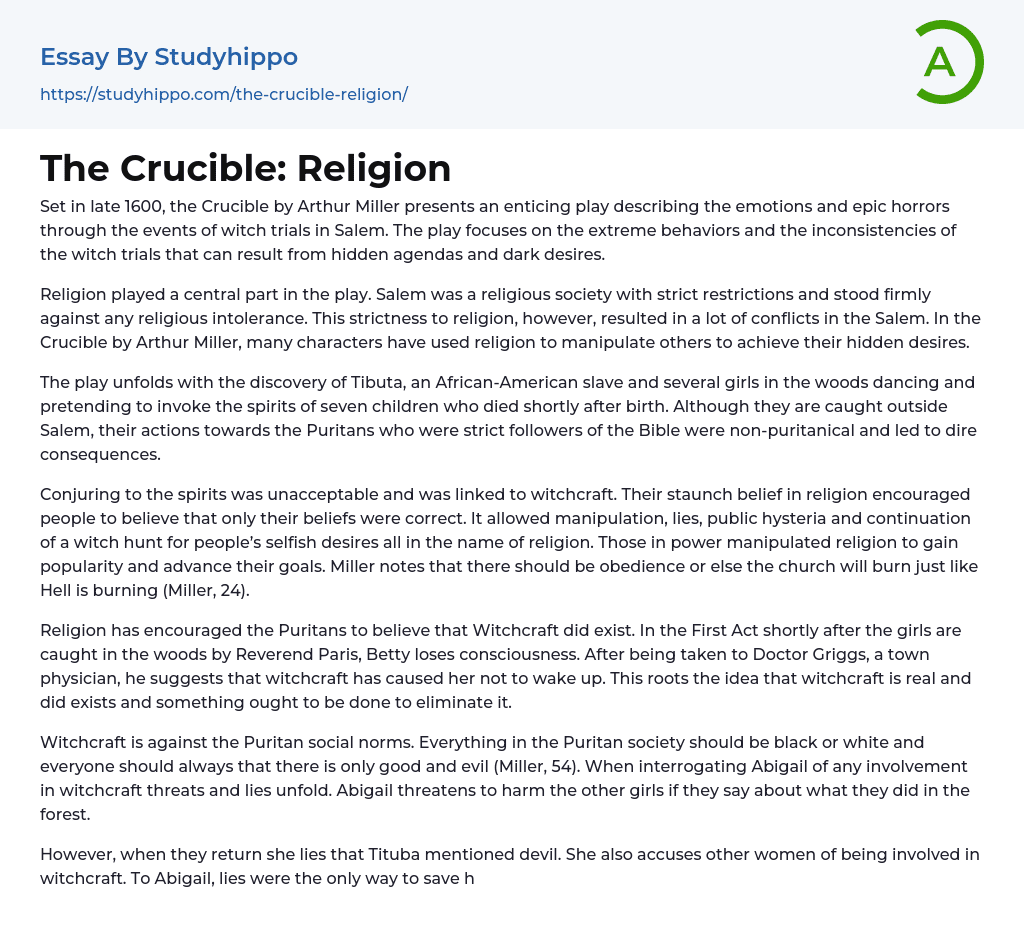Set in late 1600, the Crucible by Arthur Miller presents an enticing play describing the emotions and epic horrors through the events of witch trials in Salem. The play focuses on the extreme behaviors and the inconsistencies of the witch trials that can result from hidden agendas and dark desires.
Religion played a central part in the play. Salem was a religious society with strict restrictions and stood firmly against any religious intolerance. This strictness to religion, however, resulted in a lot of conflicts in the Salem. In the Crucible by Arthur Miller, many characters have used religion to manipulate others to achieve their hidden desires.
The play unfolds with the discovery of Tibuta, an African-American slave and several girls in the woods dancing and pretending to invoke the spirits of seven children who died shortly after birth. Although they are
...caught outside Salem, their actions towards the Puritans who were strict followers of the Bible were non-puritanical and led to dire consequences.
Conjuring to the spirits was unacceptable and was linked to witchcraft. Their staunch belief in religion encouraged people to believe that only their beliefs were correct. It allowed manipulation, lies, public hysteria and continuation of a witch hunt for people’s selfish desires all in the name of religion. Those in power manipulated religion to gain popularity and advance their goals. Miller notes that there should be obedience or else the church will burn just like Hell is burning (Miller, 24).
Religion has encouraged the Puritans to believe that Witchcraft did exist. In the First Act shortly after the girls are caught in the woods by Reverend Paris, Betty loses consciousness. After being taken to Doctor Griggs
a town physician, he suggests that witchcraft has caused her not to wake up. This roots the idea that witchcraft is real and did exists and something ought to be done to eliminate it.
Witchcraft is against the Puritan social norms. Everything in the Puritan society should be black or white and everyone should always that there is only good and evil (Miller, 54). When interrogating Abigail of any involvement in witchcraft threats and lies unfold. Abigail threatens to harm the other girls if they say about what they did in the forest.
However, when they return she lies that Tituba mentioned devil. She also accuses other women of being involved in witchcraft. To Abigail, lies were the only way to save her from the wrath of the society and the government. This is especially because expression of one’s thoughts was forbidden and because the women she was accusing were considered lesser than their male counterparts and their opinions did not count. It is also through hiding in witchcraft that she would be able to take revenge on Proctor for rejecting her.
Religion was also a tool that people used to accomplish their hidden agendas. It allowed the society to treat women as second-class to men was a must for them to wear hats to cover their hair, to be emotionless on the street and could not engage in any physical enjoyment including dancing inside Salem. Reverend Parris used religion as a weapon to assume to power.
When his niece falls sick, he gets nervous and anxious and fears that his reputation at the community and church will be ruined because of her involvement in conjuring the spirit. He
accuses Proctor his prime opponent of leading a faction against him and is angered by the community for what he terms as their lack of recognition of their obligations towards the church and the ministry. He also reminds the people he is the lord’s minister. He tells them that minister is the man of the Lord in the parish and he should not be contradicted or lightly crossed (Miller, 35).
The belief that witchcraft was real in Salem allowed people with other motives in the name of religion to eradicate the obstacles in achieving their hidden goals and desires. Miller used religion to illustrate how people can manipulate it to achieve their agendas. He also demonstrates that everyone has his or her different opinion of what is religious or not.
- Afterlife essays
- Atheism essays
- Bible essays
- Buddhism essays
- Christian Worldview essays
- Christianity essays
- Confession essays
- Cosmological Argument essays
- Deism essays
- Devil essays
- Existence of God essays
- Faith essays
- Freedom Of Religion essays
- God essays
- Hinduism essays
- Immortality essays
- Islam essays
- Jainism essays
- Jews essays
- Judaism essays
- Miracle essays
- Monk essays
- Monotheism essays
- New Testament essays
- Old Testament essays
- Pilgrimage essays
- Puritans essays
- Revelation essays
- Ritual essays
- Salvation essays
- Sin essays
- Sinners essays
- Soul essays
- Taoism essays
- Temple essays
- Theology essays
- 1984 essays
- A Farewell to Arms essays
- A Good Man Is Hard to Find essays
- A Hanging essays
- A Lesson Before Dying essays
- A Long Way Gone essays
- A Rose For Emily essays
- A Separate Peace essays
- A Tale Of Two Cities essays
- A Very Old Man With Enormous Wings essays
- Adventures Of Huckleberry Finn essays
- Alice in Wonderland essays
- All Quiet on The Western Front essays
- Allegory of the Cave essays




